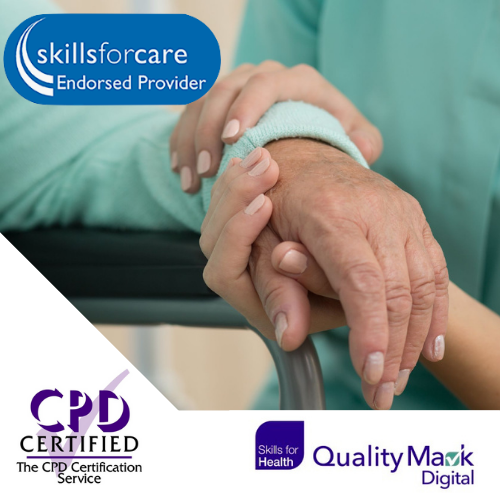

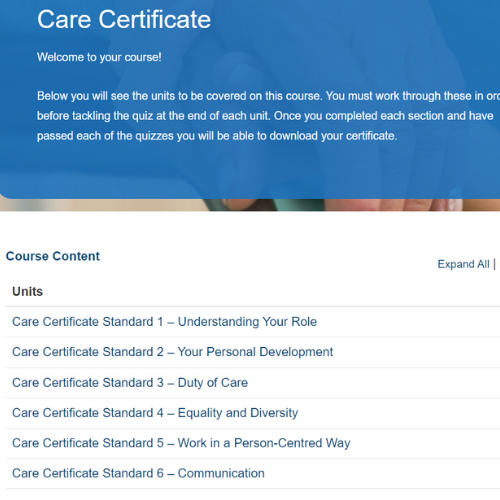


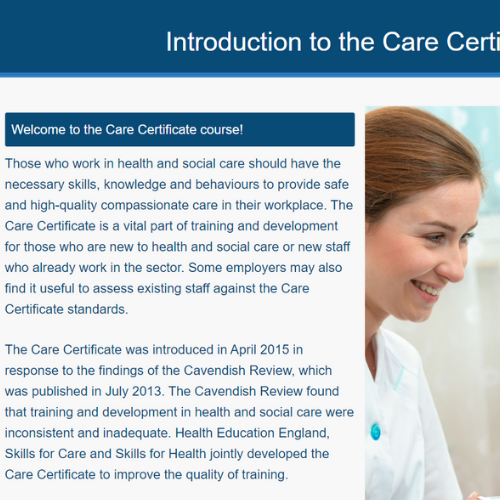

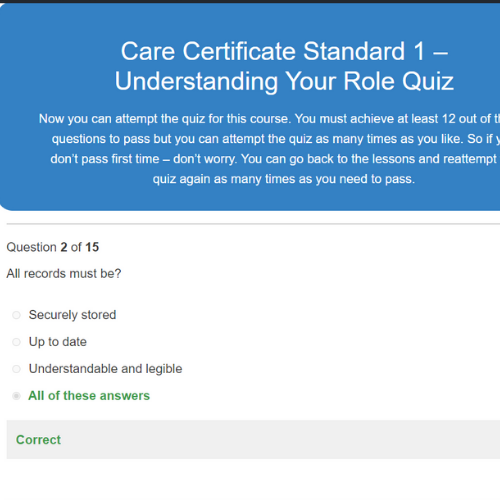
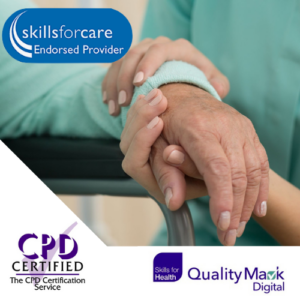
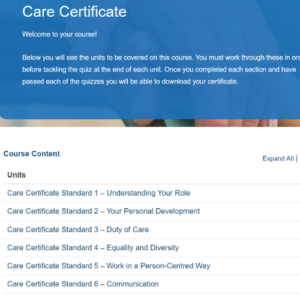
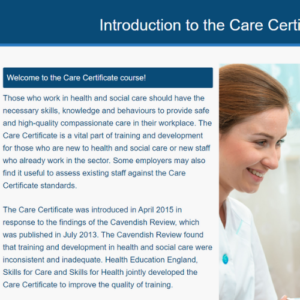
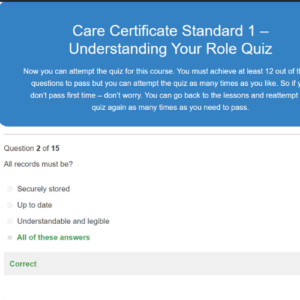
Care Certificate
(669 Reviews)
$ 80
Our Care Certificate course covers the 15 different Care Certificate standards, this course is suitable for new employees working in health and social care roles. This course will provide you with the fundamental skills that are needed in your health and social care job role, to provide quality care.
This course includes the option to play audio at no extra cost!
All about this course
Those who work in health and social care should have the necessary skills, knowledge and behaviours to provide safe and high-quality compassionate care in their workplace. The Care Certificate is a vital part of training and development for those who are new to health and social care or new staff who already work in the sector. Some employers may also find it useful to assess existing staff against the Care Certificate standards.
The Care Certificate was introduced in April 2015 in response to the findings of the Cavendish Review, which was published in July 2013. The Cavendish Review found that training and development in health and social care were inconsistent and inadequate. Health Education Canada, Skills for Care and Skills for Health jointly developed the Care Certificate to improve the quality of training.
The Care Quality Commission (CQC) expects health and social care providers to induct, support and train their staff appropriately. By using the Care Certificate as part of their induction programme, employers can demonstrate to the CQC that they are meeting these criteria.
The Care Certificate is made up of 15 standards. You will need to complete all of these standards in full to achieve your certificate. The 15 standards in the Care Certificate are:
These 15 standards take into account the Code of Conduct for Healthcare Support Workers and Adult Social Care Workers in Canada. The Chief Nursing Officer for Canada’s ‘6Cs’; care, compassion, competence, communication, courage and commitment.
The Care Certificate should be included as part of your induction programme as a new employee. This e-learning course supports the acquisition of knowledge for the Care Certificate. To fully implement the learning outcomes of the certificate, your employer must also assess your skills practically in your workplace against the Care Certificate Standards. You can also complete the exercises within the Skills for Care Workbook, as part of your studies.
You will earn 15 CPD points on completion of the course, this course will take around 15 hours to complete and the certificate will last for two years.
- Fully CPD registered
- Course written by experts in health and social care
- Covers the 15 different care standards
- Suitable for people working in health and social care
- Access your PDF certificate instantly on completion of the course
- Complete the online multiple choice assessments as many times as you need to pass
Units covered
- Care Certificate Standard 1 – Understanding your role – The first of the care certificate standards will introduce you to your role, including your tasks, behaviours and standards of work. You will consider experiences, attitudes, beliefs, values, aims and objectives at work. You will also explore your rights and responsibilities at work. This care certificate standard will finish by exploring equality, agreed ways of working, including working in partnership and reporting. On completion of the first standard, you will have a greater understanding of your role, how to work in ways that have been agreed with your employer and understand working relationships in health and social care.
- Care Certificate Standard 2 – Your personal development – In the second standard you will focus on your personal development, including what personal development plans are and why they are important. You will also explore supervision, appraisals and objectives. You will then consider how you can develop your core skills through learning and development, including using SMART targets and CPD courses. You will then consider the importance of developing your core skills in health and social care. This standard will finish by exploring why receiving feedback is important and the different types of feedback.
- Care Certificate Standard 3 – Duty of care – In the third standard you will focus on understanding the importance of duty of care in your role and how duty of care contributes to safe practice. You will also explore the support available for addressing dilemmas that may arise about duty of care, as well as considering the ways to deal with comments, complaints, incidents, errors and near misses in your work, including using policies and incident forms. This standard will finish by considering the ways to deal with confrontation and difficult situations.
- Care Certificate Standard 4 – Equality and Diversity – In the fourth standard, you will be introduced to equality and diversity, you will explore what each one means, as well as considering what discrimination is. You will explore the different types of discrimination. You will then learn how to tell if you are personally discriminating against someone. You will also look at the barriers to equality and diversity in care, you will then explore in detail The Equality Act 2010 and the nine protected characteristics. The standard will finish by considering the responsibilities of employers and employees and how to report concerns.
- Care Certificate Standard 5 – Work in a person-centered way – In the fifth standard you will explore person-centered values and understand the importance of working in a person centered way. You will also look at the 6Cs of care, that you need to apply in your role. You will then move on to explore what a care plan is and why they are important. You will then look at how to support individuals using the person-centred approach, you will also explore the Care Act 2014 and the Mental Capacity Act 2005. The standard will finish by exploring how to promote wellbeing and have empathy in your role.
- Care Certificate Standard 6 – Communication – In the sixth standard, you will explore why good communication is important in your role, the different types of communication, including verbal and non-verbal communication. You will explore the importance of effective communication at work, you will also learn how to meet the communication and language needs, wishes and preferences of individuals. This standard will finish with covering why confidentiality in care is vital, however you will explore when confidentiality can be broken.
- Care Certificate Standard 7 – Privacy and dignity – In the seventh standard, you will explore the principles that underpin privacy and dignity in care. You will also explore how to maintain and respect privacy and dignity. The standard will finish by considering what self care is, how to support it and why it is important. You will also look at how to raise concerns regarding an individual’s privacy or dignity.
- Care Certificate Standard 8 – Fluids and nutrition – In the eighth standard, you will look at the importance of nutrition and hydration, you will explore the relevant food safety legislation and the importance of food safety. You will also consider how to assess nutrition and hydration needs, how to work in a person-centred way when providing nutrition and hydration, you will also consider circumstances that may affect an individual’s food and drink choice, such as beliefs, preferences, health conditions, medicines and support needed for individuals to eat and drink.
- Care Certificate Standard 9 – Mental Heath, Dementia and Learning Disabilities – In the ninth standard, you will have greater understanding on mental health, dementia and learning disabilities, you will also explore key legislation around each. You will consider the ways to promote communication with individuals who have learning disabilities, you will also explore common mental health problems, the types of dementia and the signs and symptoms of each.
- Care Certificate Standard 10 – Safeguarding Adults – In the tenth standard, you will explore the importance of safeguarding vulnerable adults and what a vulnerable adult means. You will also gain a greater understanding on the types of abuse that can occur and the signs and symptoms that indicate when a person is being abused. You will also explore the relevant legislation that applies to safeguarding vulnerable adults. The standard will finish by exploring how to record and report any safeguarding concerns.
- Care Certificate Standard 11 – Safeguarding Children – In the eleventh standard, you will explore the importance of safeguarding vulnerable children, you will have a greater knowledge on the types of abuse children can experience and the possible signs and symptoms that will indicate a child is being abused. You will also learn about the relevant safeguarding legislation, including The Children’s Act 2004 and Working Together to Safeguard Children. The standard will finish by exploring how to record and report any safeguarding concerns.
- Care Certificate Standard 12 – Basic life support – In this standard, you will explore why you need basic life support training, the importance of CPR and the role of hand-only CPR, you will also look at the signs and causes of cardiac arrest. The standard will end by considering the causes of an obstructed airway and the treatment of choking in adults, infants and children.
- Care Certificate Standard 13 – Health and Safety – In this standard, you will consider why health and safety is needed in care, you will explore the main health and safety legislation that applies to health and social care workers. You will then consider employer and employee responsibilities, you will then explore health and safety in relation to administering medication, needles and sharps, moving and handling and using correct PPE.
- Care Certificate Standard 14 – Handling information – In this standard, you will explore the agreed ways of working and legislation regarding the recording, storing and sharing of information. You will identify why it is important to have secure systems for recording, storing and sharing information. You will look at the eight Caldiott Principles, data protection principles and relevant legislation. This standard will finish by exploring how you can report concerns regarding the recording, storing or sharing of information internally, you will also look at whistleblowing and reporting concerns externally.
- Care Certificate Standard 15 – Infection control – In the final care certificate standard, you will consider the different types of infections, the short-term and long-term consequences of infections, as well as the chain of infection. You will also explore the entry and exit routes of transmission and how to break the chain of infection. The standard will finish with exploring employer and employee responsibilities regarding infection control.
Skills for Care
The CPD Online College are endorsed by Skills for Care, the largest body for workforce development in social care in Canada. Only the best care training providers are able to meet their stringent requirements and the Skills for Care endorsement is the hallmark of quality when it comes to courses in the care sector.

Skills for Health – Quality Mark Digital
Having been awarded the Skills for Health Quality Mark Digital endorsement, you can be confident in how we assist learning and development throughout your course. Skills for Health are committed to improving healthcare through better training and only approves a select number of training providers that meet their exacting standards for quality assured learning and development.

Choose your course and enrol
Get started by selecting your course from our selection of industry qualifications. Each course is crafted by experts in their field and created to the highest standards. Select which courses you need and purchase multiples if you are buying qualifications for more than one person.
Quickly enrol using our one page checkout. Here you can enter all of your details and create your account with your very own password. After your purchase you can login to your account and access your course.
Work through your course
Each course is broken down into manageable sections. Work through these at your own pace and learn about each of the topics in the course. We use images, written information, diagrams and other resources to help you get to grips with the content with no hassle.
Our courses are all designed to allow progress without any assistance but our support staff can be contacted if you do need us.
Complete the final exam
Every course is assessed through a multiple choice exam. These exams use a bank of questions that have multiple options and you need to choose the correct one. You need to answer a specific number of questions correctly to pass the course and get your certificate.
If you don’t pass first time it is no problem. You can attempt the exam as many times as you need until you pass so there is nothing to worry about.
Get your certificate
As soon as you finish the course, we would send your certificate to your email. Your certificate includes the course you have studied, your name, the date of completion and a verification number that can be used by future employers to verify that you passed your course.











